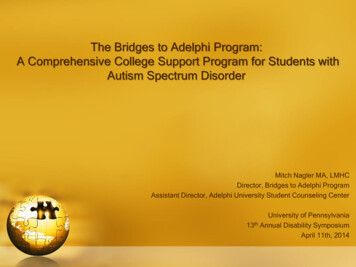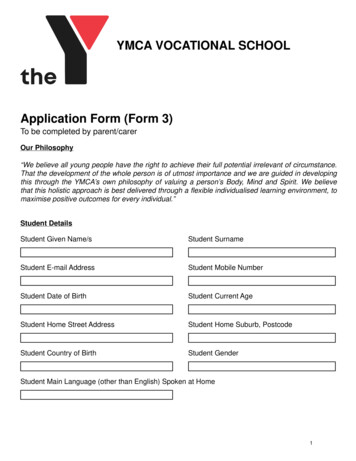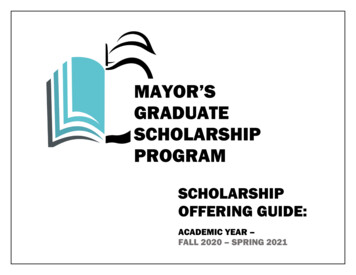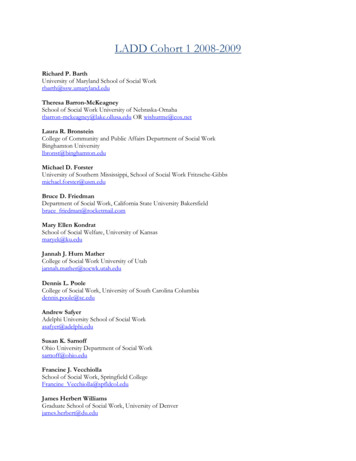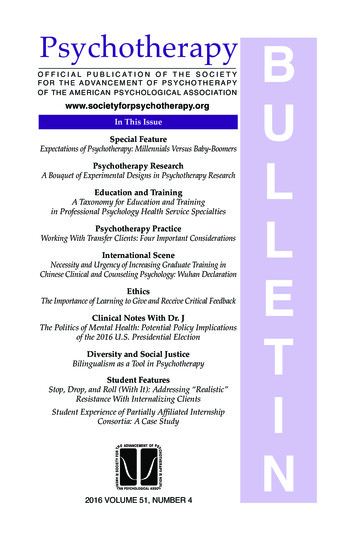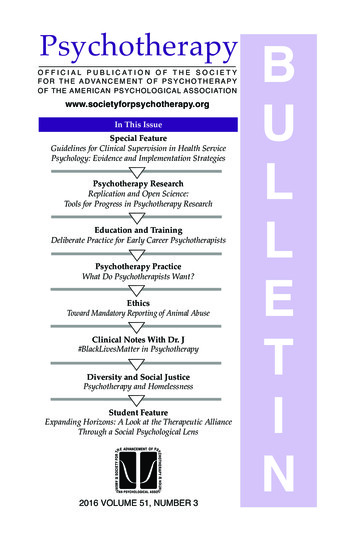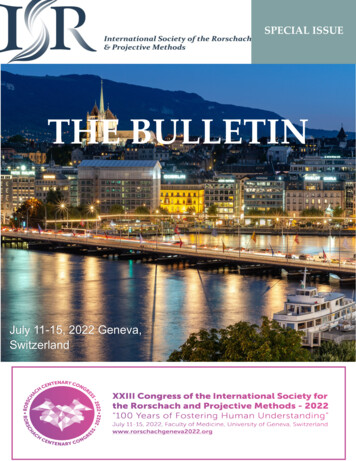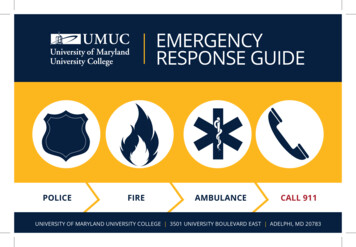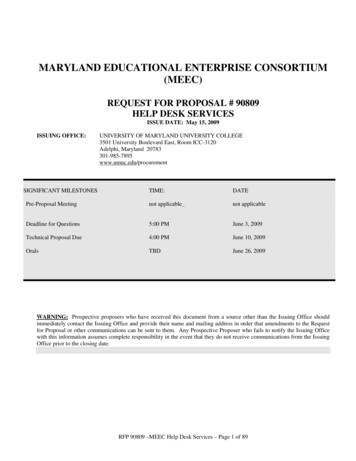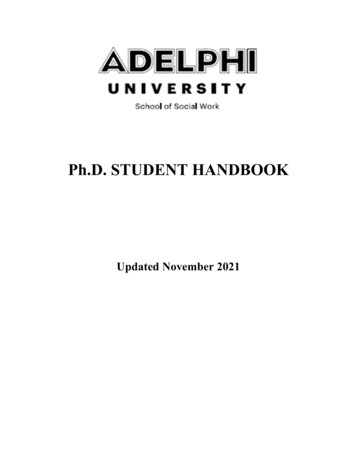
Transcription
Ph.D. STUDENT HANDBOOKUpdated November 2021
ADELPHI UNIVERSITYSCHOOL OF SOCIAL WORKPh.D. PROGRAM STUDENT HANDBOOKAdelphi University School of Social WorkGarden City, New York 11530Adelphi University is committed to extending equal opportunity in employment and educationalprograms and activities to all qualified individuals and does not discriminate on the basis of race,color, religion, gender, sexual orientation, age, national origin, disability, or status as a Vietnamera veteran. The discrimination coordinator pursuant to Section 504 of the Rehabilitation Act of1973 is the Associate Vice President, Human Resources and Labor Relations, Room 203,Levermore Hall, (516) 877-3224. In addition, the Associate Vice President for Human Resourcesand Labor Relations is the coordinator for Title IX and age discrimination enforcement.v
ContentsSCHOOL OF SOCIAL WORK AMINISTRATION AND FACULTY . viWELCOME FROM THE DIRECTOR OF THE PH.D. PROGRAM. 2MISSION AND OBJECTIVES OF THE PH.D. PROGRAM . 3PROGRAM DESCRIPTION . 4COURSE OF STUDY . 5Independent Study (SWK 899): . 6CANDIDACY EXAMINATION . 7Detailed Instructions . 8Grading Rubic . 8Candidacy Exam For Doctoral Students. 9CONTINUING MATRICULATION . 9LEAVE OF ABSENCE . 10Readmission after a Leave of Absence . 11Withdrawal for Medical Reasons . 11TIMETABLE FOR COMPLETION OF THE PH.D. PROGRAM . 12FACULTY ADVISEMENT . 13THE DISSERTATION PROCESS . 14Approval of a Dissertation Proposal. 14Proposal Stage Logistics . 14Proceeding to Defense Logistics . 16Approval of the Dissertation . 16Publication of the Dissertation . 18REGISTRATION . 19Deadlines . 19TRANSFER CREDIT . 20GRADING POLICY . 21REQUIRED GRADE POINT AVERAGE . 22INCOMPLETE GRADES . 23FINANCIAL AID . 24Graduate Assistantships . 24Scholarship and Fellowships . 24Agency Tuition Remission . 24EMAIL AND OTHER COMMUNICATIONS . 25iv
GRADUATION . 26ACADEMIC AND ADMINSTRATIVE POLICIES AND PROCEDURES . 27Academic Honesty and Plagiarism . 27Persons with Disability: Legal Rights and Responsibilities. 28Anti-Harassment Policy and Procedures . 28Internal Grievance Procedures for Ph.D. Student Complaints . 29Unethical and/or Unprofessional conduct by a Ph.D. Student . 29FACULTY RESEARCH, SCHOLARSHIP AND AREAS OF INTEREST . 31Ph.D. COURSE DESCRIPTIONS . 38DISSERTATION PROPOSAL MODEL . 43DISSERTATION RESEARCH PROPOSAL EVALUATION FORM. 48E FORM . 49CODE OF ETHICS OF THE NATIONAL ASSOCIATION OF SOCIAL WORKERS. 50CONTINUING EDUCATION UNITS [CEU] . 73v
SCHOOL OF SOCIAL WORK AMINISTRATION AND FACULTYAdelphi University Main Telephone: (516) 877-3000School of Social Work Main Telephone: (516) 877-4300Manoj Pandasani, DeanPhilip Rozario, Associate Dean for Academic AffairsElizabeth Palley, Director, Ph.D. ProgramPatricia Durecko, Coordinator of BudgetsExt. 4355Ext. 4439Ext. 4441Ext. 4383FULL TIME SOCIAL WORK FACULTYWahiba Abu-RasBeverly Araujo-DawsonRichard BelsonRoni BergerBeth Counselman-CarpenterCarol CohenCarolAnn DanielRichard FrancoeurPatricia JoyceDaniel KaplanTae Kuen KimStravroula KyriakakisChrisann NewranskyElizabeth PalleySubadra PanchanadeswaranLyn PaulJoanne Quinn-BeersLaura QuirosGeoffrey ReamPhilip RozarioCarol SussalSara TerranaRani VargheseBradley ZodikoffYiqi xt. 4318Ext. 4382Ext. 4437Ext. 4365Ext. 4420Ext. 4427Ext. 4440Ext. 4337Ext. 4324Ext. 4383Ext. 8557Ext. 4413Ext. 8558Ext. 4441Ext. 4310Ext. 8113Ext. 8606Ext. 8559Ext. 4432Ext. 4419Ext. 4433Ext. 4445Ext. 8170Ext. 4439Ext. 4443Assistant to the Doctoral Program, Kathleen Augustine. Ext. 4385For details about Faculty Research, Scholarship & Areas of Interest, please refer to Appendix Avi
WELCOME FROM THE DEANADELPHI UNIVERSITYSCHOOL of S0CIAL WORKOFFICE OF THE DEANT 516.877.4354F 516.877.4436ONE SOUTH AVENUE GARDEN CITY. NY 11530Dear Students:On behalf of our faculty, staff, and students, I welcome you to the School of Social Work. TheAdelphi University's PhD program has a rich history of commitment to training leaders in theSocial Work profession since its inception in 1975. We are proud of our graduates who havegone on to serve as full-time academics, non-profit sector CEOs, advanced practitioners andpart-time university faculty.More than at any other time in our history, our social work profession needs to be focused,engaged and pro-active. Our programs hopes to prepare the next generation of scholars, activistsand practitioners who promote social justice and human rights in all their endeavors.Our nationally and internationally renowned faculty are here to guide you in your educationaljourney. They are committed to your success and are available to you as you pursue your studies.Our faculty are widely recognized for their scholarship, research pursuits, pedagogical strengthsand an overall commitment to excellence. Students are provided with an extraordinarily richexperience in the classroom due to the depth of their professors' clinical, research andadministrative backgrounds.I look forward to getting to know you and working with you as you move forward towardsrealizing your career goals. We are honored that you have made a decision to partner with us onthe next chapter of your life. I wish you all the very best in your journey.1
WELCOME FROM THE DIRECTOR OF THE PH.D. PROGRAMCongratulations on being admitted to the Ph.D. program at the Adelphi University School ofSocial Work! You have worked hard to join this prestigious program. We are happy that youmade the choice to come to Adelphi. We hope that your doctoral education will be exciting,inspiring and challenging. Our unique and flexible curriculum and our exceptional faculty is wellsuited to meet the educational needs of our diverse student body.The Ph.D. program is designed to prepare students to assume the role of thought leaders,researchers and practitioner-scholars. We are committed to developing and augmenting yourexisting skills and preparing you to contribute to social work knowledge base in your area ofexpertise. Upon graduation, many of you may choose an academic path while some of you maytake on leadership roles at agencies. Regardless of your chosen career, we encourage you toembrace a culture of critical thinking and lifelong learning.While you are a student, there will be many demands on your time and energy. Please make sureto balance demands from home, school and work with self-care. We do hope that you will drawand build on the support of your cohort peers, the larger doctoral student and faculty community,family and friends. Past students have repeatedly touted the value of supportive networks andcollaborative partnerships as the cornerstone of successful completion of the Ph.D. program.The faculty and staff of the Ph.D. program are invested in helping students successfully completethe program. Please do not hesitate to reach out to me and other members of the faculty and staffif we can assist you in any way. In Appendix A of this handbook, you will find bio-sketches ofall full-time faculty at the School of Social Work. This handbook is akin to a guidebook and Irecommend that you take the time to review and use it as often as needed.Finally, make sure to have fun by actively collaborating with your peers and faculty members.As the Director of the program, I am committed to serving as a mentor and guide to you in thisjourney.On behalf of the faculty and staff, welcome to the program and we wish you all the very best!!Elizabeth Palley Ph.D., JD, M.S.W.Associate Professor & Director of the Ph.D. Program2
MISSION AND OBJECTIVES OF THE PH.D. PROGRAMThe Ph.D. program of the Adelphi University School of Social Work prepares social work andother human service professionals to assume leadership in the profession. Grounded in anevolving knowledge base, the program aims to expand students’ capacities to criticallyconceptualize, develop, evaluate and disseminate knowledge that is relevant to social problemsthat have an impact on the human condition.Our accessible Ph.D. program offers part-time and full-time course which with the aim ofdeveloping graduates who are able to: Develop their expertise in a specialized area of knowledge and locating it within existing socialwork knowledge; Critically analyze theories, practices, policies, and research; Integrate social work research practice, education, and teaching. Promote social work values of social justice and equality as they apply social work knowledgeto addressing social issues. Advocate for and implement social work values and ethics in research and knowledgedevelopment.3
PROGRAM DESCRIPTIONThe Adelphi Ph.D. program is designed for working professionals. There are two programoptions: part-time and full-time.Students who elect the part-time option take two courses per semester one day a week for fouryear. Students who elect the full-time option take four courses two days a semester for two years.Course expectations, however, are the same across both programs. Degree requirements must becompleted within prescribed timelines excluding any approved official leaves of absence. Otherrequirements for students in the program include:1. Maintenance of a grade point average (GPA) of 3.3 or higher (B or higher) throughoutthe course of study.2. Complete 48 doctoral level credits.3. Pass the Candidacy Examinations which are given after completion of 24 credits, i.e.,after two years of study for part-time students and one year for full-time students.4. Obtain an approved dissertation proposal within two years of completing course workregardless of part/full time status in the program (excluding all approved official leavesof absence).5. Complete a written dissertation and successfully defend it within six years of completingcourse work (or 4 years after completing proposal defense) regardless of part/full timestatus in the program (excluding all approved official leaves of absence).6. Maintain status in the program by (a) registering for course work, (b) registering forContinuous Matriculation after course work has been completed, or (c) securing anapproved leave of absence from the Director of the Ph.D. Program.4
COURSE OF STUDYPart-time ScheduleFull-time ScheduleFirst Year (Monday)Fall810 Epistemology & Social Work Knowledge842 Human Behavior Theory, EmpiricalKnowledge & Contemporary PracticeSpring850 Comparative Approaches to Social WorkResearch: Quantitative882 Comparative Approaches to Social WorkResearch: QualitativeFirst Year (Fall)Monday810 Epistemology & Social Work Knowledge842 Human Behavior Theory, EmpiricalKnowledge & Contemporary PracticeWednesday845 Cross-national Perspectives on SocialProvision860 Social Work and Social ScienceSecond Year (Wednesday)Fall845 Cross-national Perspectives on SocialProvision860 Social Work and Social ScienceSpring843 Social Work Practice with Individuals:Theory & Research876 Social Work with Small Systems: Theory andResearchSpringMonday850 Comparative Approaches to Social WorkResearch: Quantitative882 Comparative Approaches to Social WorkResearch: QualitativeWednesday843 Social Work Practice with Individuals:Theory & Research876 Social Work with Small Systems: Theory andResearchThird Year (Monday)Fall844 Program Development and Evaluation851 Foundations to Data Analysis: Univariate &Bivariate StatisticsSecond Year (Fall)Monday844 Program Development and Evaluation851 Foundations to Data Analysis: Univariate &Bivariate StatisticsWednesday853 Advanced Research Topics: QualitativeData Analysis878 Theories and Research on Organizations andLeadershipSpring856 Multivariate Analyses857 U.S. Social Work In Historical & NationalCrossnational PerspectiveFourth Year (Wednesday)Fall853 Advanced Research Topics: Qualitative DataAnalysis878 Theories and Research on Organizations andLeadershipSpring811 Social Work Education: Issues & Processes854 Proposal Development SeminarSpringMonday856 Multivariate Analyses857 U.S. Social Work In Historical & NationalCrossnational PerspectiveWednesday811 Social Work Education: Issues & Processes854 Proposal Development Seminar5
Independent Study (SWK 899):Students may take an independent study, with the approval of the Director of the Ph.D. program,when the student can enlist an interested faculty member to serve as the independent studyinstructor.6
CANDIDACY EXAMINATIONAN OVERVIEWFor the candidacy exam, you will be required to complete a ‘literature review.’ This means thatyou will complete a review of past literature relating to your topic area. The goal of completing aliterature review is to examine and understand what has been done in the past and help you toproceed into your own work with a deeper understanding of established knowledge. This willalso help set the stage for your study.To complete a literature review, you must complete the following tasks:1. Clearly identify a topic that you are interested in studying.2. Use the library databases to identify peer-reviewed journal articles that pertain to yourtopic of interest (keep a note of the search terms, phrases, databases, etc. that yousearched).3. Read the abstracts and examine the results and finalize 10-12 articles (no more than 15 intotal) that you feel ideally speak to your topic of interest.Note: Please bear in mind that the articles that you pick on your topic should speak to theoretical,epistemological, empirical, policy and practice aspects related to your area of interest.4. Start reading the articles and organizing the content in terms of theories, researchmethodologies, policy and practice content.5. Formulate the outline.6. Flesh out each of the aspects (as described in the ‘detailed outline’ handout).REMEMBER: In the literature review, you are expected to ‘compare and contrast’ thecontents of each of the articles and not describe each of the articles in detail. This is an exercisein trying to understand how scholars have used different approaches to study the topic and yourjob is to summarize the same, not catalogue each article. Use direct quotes from the articlessparingly, paraphrase succinctly.Some tips: (more details of the exam below)1. Your literature review should be organized clearly into sections.2. Begin with a brief introductory paragraph stating your topic and briefly describing yoursearch strategies, results and your decisions for choosing the articles (not more than 15 intotal).3. Address the theoretical underpinnings that have been commonly addressed and used thepast by scholars who have studied this topic and compare and contrast and weigh in onwhich ones were most appropriate in your opinion.4. Examine the research methodologies used by the researchers in the past and compare andcontrast the methods, the strengths, weaknesses of the methods used.5. Compare and contrast the policy and practice implications (separately) that emerge fromthe articles.6. Conclude with a paragraph or two with the gaps that you have identified and how youthink you think your research area of interest can potentially fill that gap.7. Use APA style citation throughout the paper.8. The expected length of your literature review is around 12-15 pages, double spaced and12 size font with 1” margins.7
Detailed InstructionsWrite ‘one’ paper that will have various components including critically reviewing theoreticalperspectives, research methodologies (quantitative, qualitative or mixed), and policy and practiceimplications in your topic area.Bring relevant peer-reviewed journal articles that will inform your paper on these variousaspects.Practice Academic Honesty: You are required to adhere to the Code of Conduct as stipulated bythe University guidelines. Please refer to duct/for further information.a. All exams will be uploaded on to TurnItIN for grading.b. Internet searches during the exam is not allowed and will be sufficient cause forthe student to earn a failing grade in the exam.A. FORMAT: Students will be given the exam when school ends and have until the beginningof August to submit their paper. Please ensure that the paper that you submit is your own original work. Keepdirect quotes to a minimum, paraphrase your ideas, and actively synthesize thekey points from each of the articles and present it succinctly.Grading Rubic Grading:o Topic area identification Problem statement: 10 pointso Epistemological & Theoretical frameworks: 25 pointso Past research critique: 25 pointso Policy implications: 20 pointso Practice implications: 20 points Two faculty members will independently grade the whole exam. All students will begiven extensive feedback. Grading will take place within 2 weeks of papersubmission. Students will be given a grade of revisions necessary, pass or high pass. If a student is required to revise their paper and the graders are not in agreement thatit is a passing paper, a third grader will be asked to grade the paper/ provide a finalgrade. A student who revises their paper will receive their grade within 5 days unless there isa need for a third grader in which case, they will be told within 8 days.8
Candidacy Exam For Doctoral StudentsGoal of the candidacy exam: To evaluate students’ competency to complete the tasksinvolved in working towards completing a proposal and dissertation subsequently.Assignment: Complete a literature review on your research topic.1. State what area of inquiry you plan to discuss in this literature review. Clearly articulate atopic area.Write a brief problem statement on your topic area outlining the key reasons for wantingto study it, including extent of the problem, populations that may be affected by the same,and the importance of studying this topic.2. What are some salient epistemological issues in conducting research in this area ofinquiry? Select an epistemological perspective and discuss how this perspective informsyour approach to inquiry.In consideration of various theories (e.g., individual or systems practice, organizational,macro-sociological, economic and human behavior) that have been used in past research,pick two that you consider most relevant for your topic. Discuss the relative strengthsand limitations of these theories as they pertain to your research topic.3. Critically review the literature in your topic area with respect to research methods andsummarize the key findings. In your review, highlight the strengths and weaknesses ofthe methods and designs that were used to further the knowledge, and discuss theirappropriateness for the research question/s under examination. Support your assessmentwith a clear rationale.4. Explain how policy relates or is excluded from to the theoretical perspectives that youhave chosen to examine your topic area. Is there a policy that has been designed toaddress this issue? If so, using a specific policy analysis theory, examine the extent towhich the policy works to help address this problem. If not, identify a specific policyanalysis theory and describe how it could help to focus the policy implications of yourliterature review.5. Explain how individual and systems practice is included or excluded from the literatureyou have examined related to your topic area. Discuss key implications for practicebased on the review of the literature; analyze how specific individual and systemstheories help inform the practice implications of your literature reviewCONTINUING MATRICULATIONFollowing completion of the 48-credit course requirement and successfully passing theCandidacy Examination, students must register for Continuing Matriculation if they wish toremain in good standing in the Ph.D. Program and avail themselves of the University's resources,including the Swirbul Library. Students who are not registered and who do not have an approved9
leave of absence (p. 10) will be considered to have left the program and must petition theDirector of the Ph.D. Program for readmission within the 10-year time limit. Students who seekreadmission more than 10 years after matriculation will be considered as new applicants to theprogram.The two options for Continuing Matriculation status are:SWK 895 Continuing Matriculation with AdvisementOrSWK 896 Continuing Matriculation without AdvisementStudents are allowed dissertation advisement during their coursework. Advisement can be takeneither with the required courses, typically after the student has successfully completed thecomprehensive exams. Students may also choose to start on the advisement followingcompletion of course requirements. If students get advisement while they are taking at least onedoctoral course, they do not have to pay an additional fee for advisement for that semester orenroll in SWK 895 or SWK 896. Students will need to speak with the Program Director shouldthey wish to get advisement during their coursework. Matriculation with advisement should be chosen when the student plans to meet regularlywith an advisor or have their material reviewed by their advisor. The cost for this isequivalent to a 3-credit course, plus matriculation fees.Matriculation without advisement should be chosen when a student does not expect inputfrom the advisor during the upcoming semester (an example might be during datacollection). The cost for this is the matriculation fees only.Students who have completed coursework must register every semester for one of thesetwo, unless they have requested and been granted a leave of absence.LEAVE OF ABSENCEStudents who wish to remain in good standing in the Ph.D. program but are unable to pursuetheir course work or dissertation study must formally request a leave of absence. Leaves aregranted for reasons that preclude attendance in classes or pursuit of research on a dissertationbecause of extenuating circumstances (e.g., health, family or professional responsibilities). Leaveof absence may only be considered in the cases of students who are in good academic standing.A written request for a leave of absence must be submitted to the Director of the Ph.D. Program.The leave is subject to the approval of the Director and is granted for no more than one year at atime (two academic semesters). Total leaves may not exceed two years or four academicsemesters. Students on leave of absence may not use the resources of the University, includingthe library and faculty advisement. The time that a student is on leave is not counted indetermining the 10-year time limit for completion of all requirements for the degree (see thefollowing section for the Timetable).10
Readmission after a Leave of AbsenceReadmission to the University, except from a medical leave, is sought in writing from the deanof the appropriate school or college and is subject to the particular readmission policies of thatgraduate program.Withdrawal for Medical ReasonsStudents requesting a withdrawal from the University because of medical reasons must submitthe appropriate medical documentation and a letter requesting a medical withdrawal to the Officeof Academic Services and Retention [Requirements for Medical Leave of Absence can befound here: http://academics.adelphi.edu/asr/formspubs.php]. This must be done during thesemester for which the leave is requested. Students approved for medical withdrawal might havea credit posted to their account to be applied toward future semesters. All unused credit will beforfeited after one year of issuance and tuition and fee charges will not be refunded. Studentswho withdraw from the University for Medical Reasons will be dropped from all of theircourses. Students wishing to return after a Medical Withdrawal must submit medicaldocumentation clearing them for return to the Office of Academic Services and Retention.11
TIMETABLE FOR COMPLETION OF THE PH.D. PROGRAM Students must register for and take the Candidacy Examinations following completion of24 course credits, unless there are extenuating circumstances. If so, the student shouldappeal in writing to the Director of the Ph.D. Program for permission to delay theexamination.Students must have an accepted dissertation proposal not later than 2 years after theyhave completed their coursework, excluding any official leaves of absence. Whenappropriate, based on the recommendation of the adviser to the Director of the Program,students may be granted an extension of a maximum of 2 semesters (one semester at atime) to complete their proposal defense. However, this will automatically mean that thetime that the time for dissertation defense is reduced accordingly.Students must complete the dissertation and successfully defend it in an oral examinationand have the dissertation accepted by the faculty no later than 6 years after they havecompleted their coursework, excluding any official leaves of absence.Matriculation in the Ph.D. Program may not exceed 10 years for a part-time student and 8years for a full-time student; this time period is exclusive of any official lea
ADELPHI UNIVERSITY SCHOOL of S0CIAL WORK OFFICE OF THE DEAN T 516.877.4354 F 516.877.4436 ONE SOUTH AVENUE GARDEN CITY. NY 11530 Dear Students: On behalf of our faculty, staff, and students, I welcome you to the School of Social Work. The Adelphi University's PhD program has a rich history of commitment to training leaders in the
